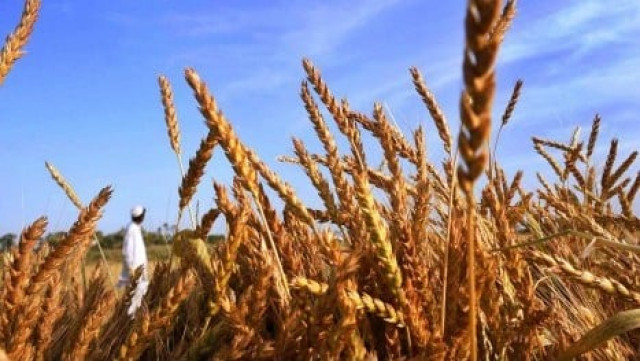Sindh farmers await wheat policy
Growers concerned as crop harvest to begin in two weeks

Though wheat harvest is expected to commence in the next two weeks in Sindh, the provincial government has not yet announced the wheat procurement policy, leaving farmers perplexed.
In a meeting with the Sindh Abadgar Board, the farmers voiced concern that wheat harvest in Sindh was to start within 15 days but the Sindh government had not yet announced the procurement policy.
“Procurement price of wheat should be notified by the province,” emphasised Sindh Abadgar Board Senior Vice President Mahmood Nawaz Shah.
“Wheat procurement policy is important to keep a balance between demand and supply.”
When farmers do not get a fair price, they hold back the commodity for fetching better prices. However, this leads to imbalance in the market and prices increase for end-consumers.
The current wheat price in the market is Rs2,200 per 40 kg, but according to a recommendation of the Sindh government, the price should be fixed at Rs2,000, said Shah.
“This will ensure abundant wheat supply for procurement and discourage hoarding as happened in the past two years.”
The provincial and federal governments should resolve differences on the procurement price at the earliest, remarked Sindh Abadgar Board member Dr Bashir Nizamani. “Wheat procurement should start by the first week of March,” he added.
Endorsing Nizamani’s views, another member Syed Nadeem Shah said there should not be a ban on the movement of wheat as the administrative and arbitrary measure had worked in favour of hoarders in the past and neither helped the growers nor the consumers.
The procurement process should be completed transparently and stakeholders should be involved in it, Shah stressed, adding that the procurement target should be increased to benefit the consumers, as it was one of the supply balancing measures to control rising prices of flour.
“We urge the government of Sindh to prepare a procurement plan as early as possible, so that last year’s situation does not repeat - when Rs30 billion was siphoned off,” he said.
It was due to the “price difference as wheat was procured from farmers at Rs35 per kg and was sold in the open market at Rs60 per kg,” he said.
Vegetables policy The absence of a policy and the knee-jerk reaction have led to a situation where farmers are facing losses on onion, tomato, cauliflower, cabbage and other vegetables’ supply.
“The current wholesale price of onion is Rs8 per kg, tomato Rs6 per kg, cauliflower Rs3 per kg and cabbage Rs5 per kg,” Shah added. “Lack of attention to the horticulture sector exposes farmers to a high risk of price crash,” he lamented.
“Last year when onion production was in full swing during October, the government created hurdles to export,” Shah said, adding that as a result, Pakistan’s economy lost an opportunity to earn foreign exchange and onion prices went down from Rs40 to Rs8 per kg (for farmers).
Moreover, onion imports did not stop. In the case of tomato, imports continued till the point prices crashed. In other countries, the risk of price crash is reduced by processing and facilities for storage and export.
“Unfortunately, in Pakistan there is no policy to encourage processing and export of vegetables,” he said. “Farmers, therefore, face all the losses



















COMMENTS
Comments are moderated and generally will be posted if they are on-topic and not abusive.
For more information, please see our Comments FAQ